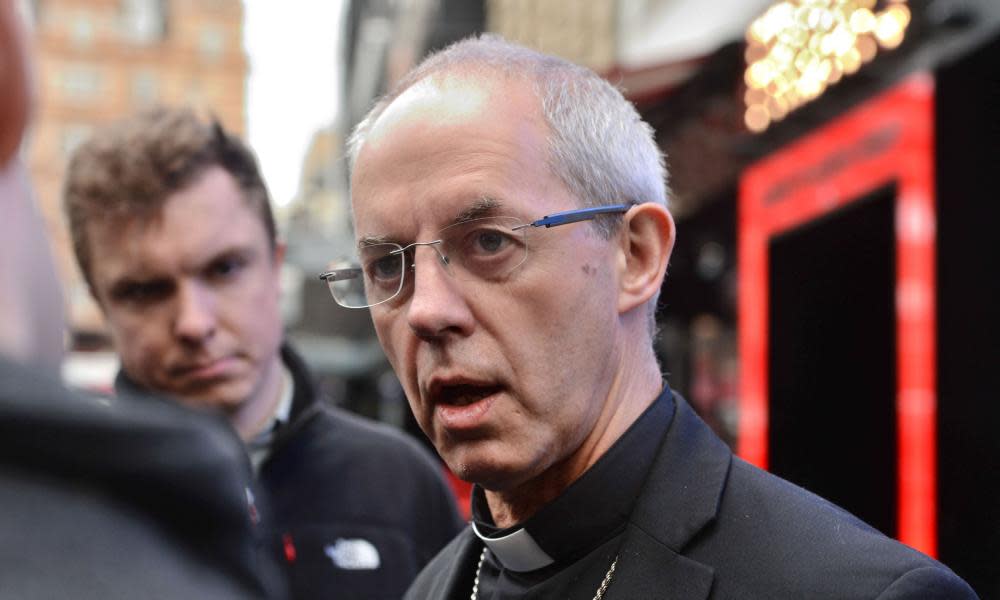Justin Welby backs cross-party approach to Brexit to 'draw out poison'

The Archbishop of Canterbury has called for a cross-party Brexit commission to “draw much of the poison from the debate” and help unite British regions, social groups, faiths and generations.
Justin Welby argued that the Grenfell Tower tragedy and a series of terror attacks had triggered an urgent need for reconciliation and for the outcome of EU talks to be focused on what values the country represents.
He said the decision to leave the EU continued to divide the nation, but that any moves to exploit the differences for political advantage could have serious consequences.
“Exit negotiations will be fierce and the differences on what we should aim for, and how, are very deep. They divide our politicians and our society. With a hung parliament, there is an understandable temptation for every difference to become a vote of confidence, a seeking of momentary advantage ahead of the next election,” he wrote in an article for the Mail on Sunday.
“For that to happen would be a disaster if our negotiators, faced with the united determination of the EU, go into the room without confidence in their backing in the UK. It might turn us inwards and forfeit the opportunity to be a country the world admires and blesses for our generosity and vision.”
He said politics was “rightly hard and tough” but urged politicians to find ways to neutralise any temptation to take advantage from great events, ranging from Brexit to the fire at Grenfell Tower and several terror attacks within months.
Welby proposed a forum or commission that would allow Brexit differences to be fought out in order to reach a commonly agreed negotiating aim.
“Obviously it would be under the authority of parliament, especially the Commons. It would need to be cross-party and chaired by a senior politician, on privy council terms. It could not bind parliament, but well-structured it could draw much of the poison from the debate.”
The religious leader began his article with a graphic description of the charred ruins of Grenfell, firefighters “slumped in exhausted sleep” and those with the “unspeakable duty of sifting through the ruined homes”.
He praised a multi-faith, compassionate response, while also citing the way people reacted to a series of terror attacks, which on one occasion reduced him to tears.
However, Welby highlighted how the north Kensington tragedy had tested “how we handle diversity, integration, social mobility and inequality”.
“Recent events have highlighted the urgent need for a process of internal reconciliation, between regions, social groups, faiths and generations. The future of this country is not a zero-sum, winner-take-all calculation but must rest on the reconciled common good arrived at through good debate and disagreement.”
The idea for a cross-party commission was floated after the election by Labour’s Yvette Cooper who argued “there is neither strength nor stability in a narrow, bunkered one-party approach; you need to include people with different ideas to get the best deal and widest support”.
The former Tory leader William Hague also waded into the debate suggesting the government should look to a series of business groups, the TUC, leaders of devolved governments and opposition parties – including Jeremy Corbyn – to discuss issues.
“If you are willing to discuss how to make this work within these parameters, come in and we will be open to your views,” he said.
The ideas have gained growing support after polls suggested a growing proportion of the public preferred the approach, while a petition calling for Brexit negotiations to be conducted by a multi-party committee attracted more than 130,000 signatories.
However, the Labour leadership has been resistant to the idea of any formal alliance with the Conservatives. The shadow Brexit secretary, Keir Starmer, told the Guardian he would reach out to politicians on the backbenches and other opposition parties when it came to parliamentary votes.
Priti Patel, the international development secretary, told ITV’s Robert Peston that she disagreed with the idea of a cross-party commission.
“We’re pretty clear the vote happened last year and we don’t need to have a rerun of the arguments of remain and leave. The technical details, in terms of how we leave, that work is in train already through David Davis and through his government department, working across the whole of the civil service and obviously our colleagues in Europe, but also with our ambassadors as well.”
Patel said Theresa May’s focus was on achieving the best possible deal.
Cooper responded to Welby’s comments by claiming that a cross party approach was more important than ever, and that it was not good enough for Brexit to be hammered out through “back room deals by a government which has just lost its majority”.
“The Government cannot carry on as usual, pretending that the election didn’t happen and that the public didn’t deliver their verdict on Theresa May’s plan. A Brexit deal - if it is to last - must have a mandate and broad backing behind it, instead of something cobbled together by a small Conservative cabal,” she said.
“Justin Welby is right, now we all have a big job to do in pulling our divided country together - and this could be a start.”

 Yahoo News
Yahoo News 
